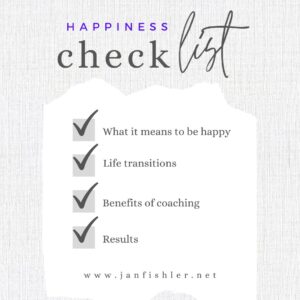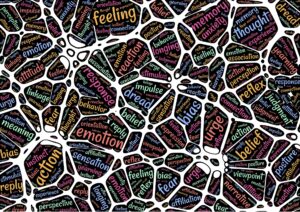 I’m a huge fan of lists . I use them often because they are abbreviated reminders of what I want to accomplish in a given day, week, or year. Lists help me collect my thoughts and prioritize what needs to be done. They shape my day and free me up to think about more important things. Lists are time-savers and sometimes lifesavers. Lists are also a great way to highlight important facts.
I’m a huge fan of lists . I use them often because they are abbreviated reminders of what I want to accomplish in a given day, week, or year. Lists help me collect my thoughts and prioritize what needs to be done. They shape my day and free me up to think about more important things. Lists are time-savers and sometimes lifesavers. Lists are also a great way to highlight important facts.
The following lists were developed to generate an overview of coaching and how it can help you bring clarity and peace of mind into your life. Because happiness means different things to different people, the first list provides (synonyms) for happiness. The second list covers topics a happiness coach might employ to help you become happier. The third list contains situations that might motivate you to seek out a coach.
Saying you want to be happy generally means you want more…
- Excitement
- Joy
- Pleasure
- Gratitude
- Love
- Enchantment
- Peace
- Fulfillment
- A sense of purpose or meaning
- Connection
- Hope
- Playful
- Proud
- Accepted
- Optimistic
- Confident
- Inspired
- Contentment
Happiness coaching can show you how to:
- Create your definition of happiness
- Improve the quality of your life
- Explore your emotions to live more fully and authentically
- Embrace your emotions, not fear them
- Welcome everything life has to offer
- Love yourself and others
- Improve your emotional well-being
- Turn pain into a positive life transformation
- Create, follow, and accomplish your dreams
- Find meaning and value in your life
- Discover the peace and contentment within
- Empower you to live a happier life, whatever that means to you
- Increase your sense of well-being
- Reduce or eliminate habits that bring you down
- Increase habits that improve the quality of your life
- Live life to your full potential
- Savor little moments
- Feel peace more often
- Process and let go of painful memories
Life transitions that may lead you to seek out a happiness coach:
- Ending a career/job
- Starting a new career/job
- Wanting to start a new business
- Recently ending a relationship
- Having all the youngest children in the family finally be in school
- Having adult children finally leave the house
- Moving to a new town
- The death of a loved one in the recent past
- An unexpected medical diagnosis of a loved one (or of themselves)
- Having gone through a challenging year and wanting new inspiration
- Middle age
- recent retirement





